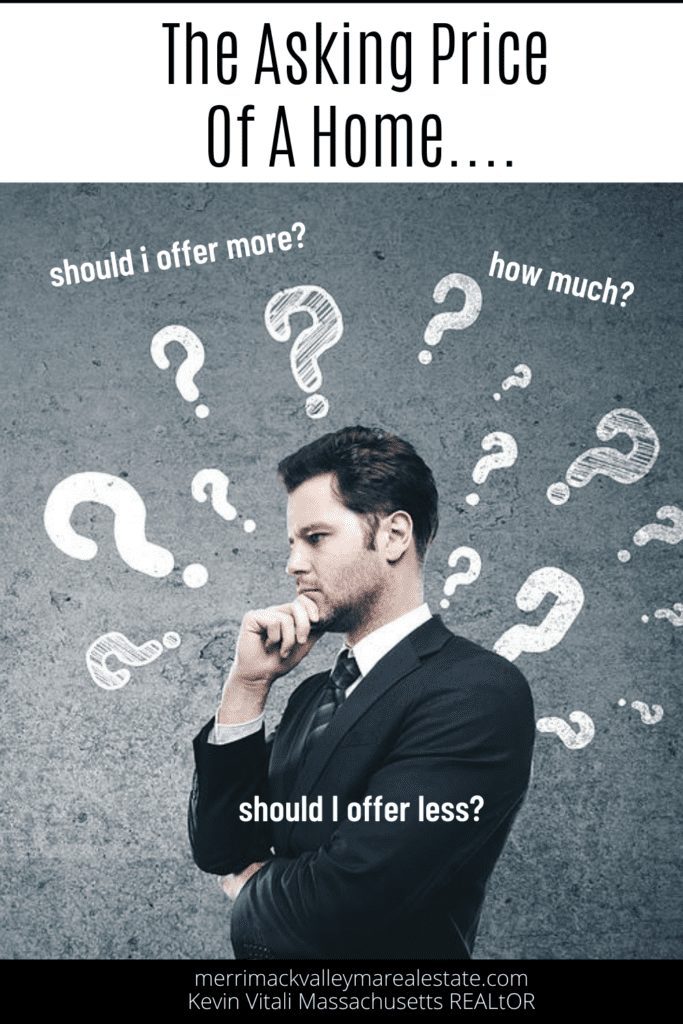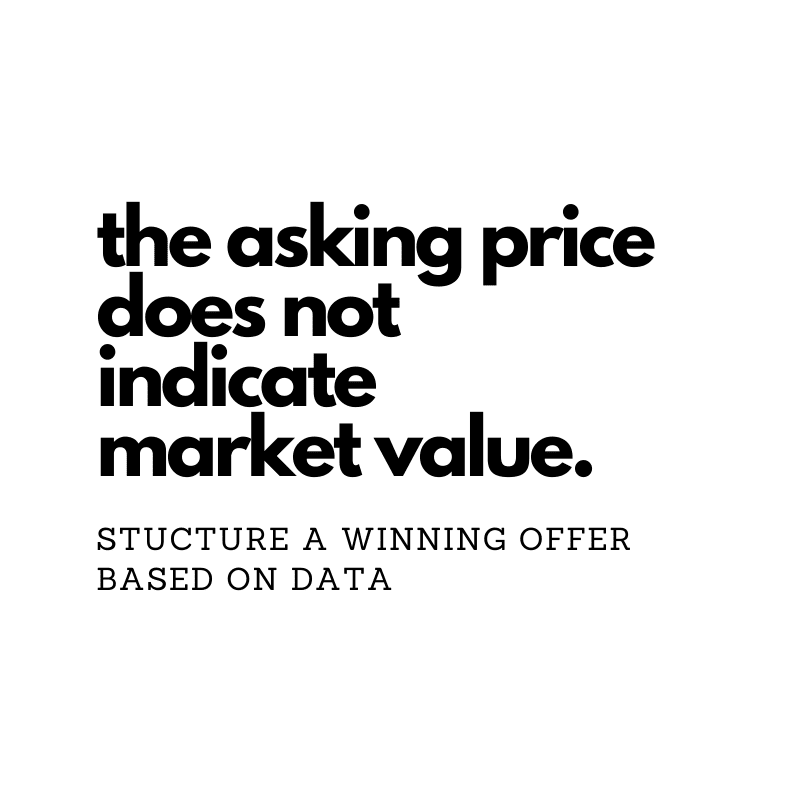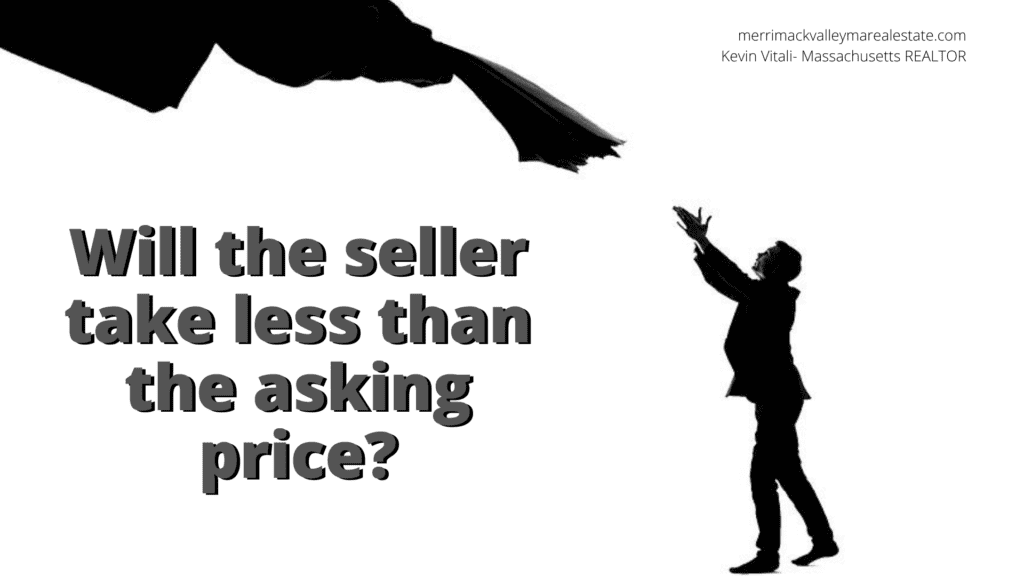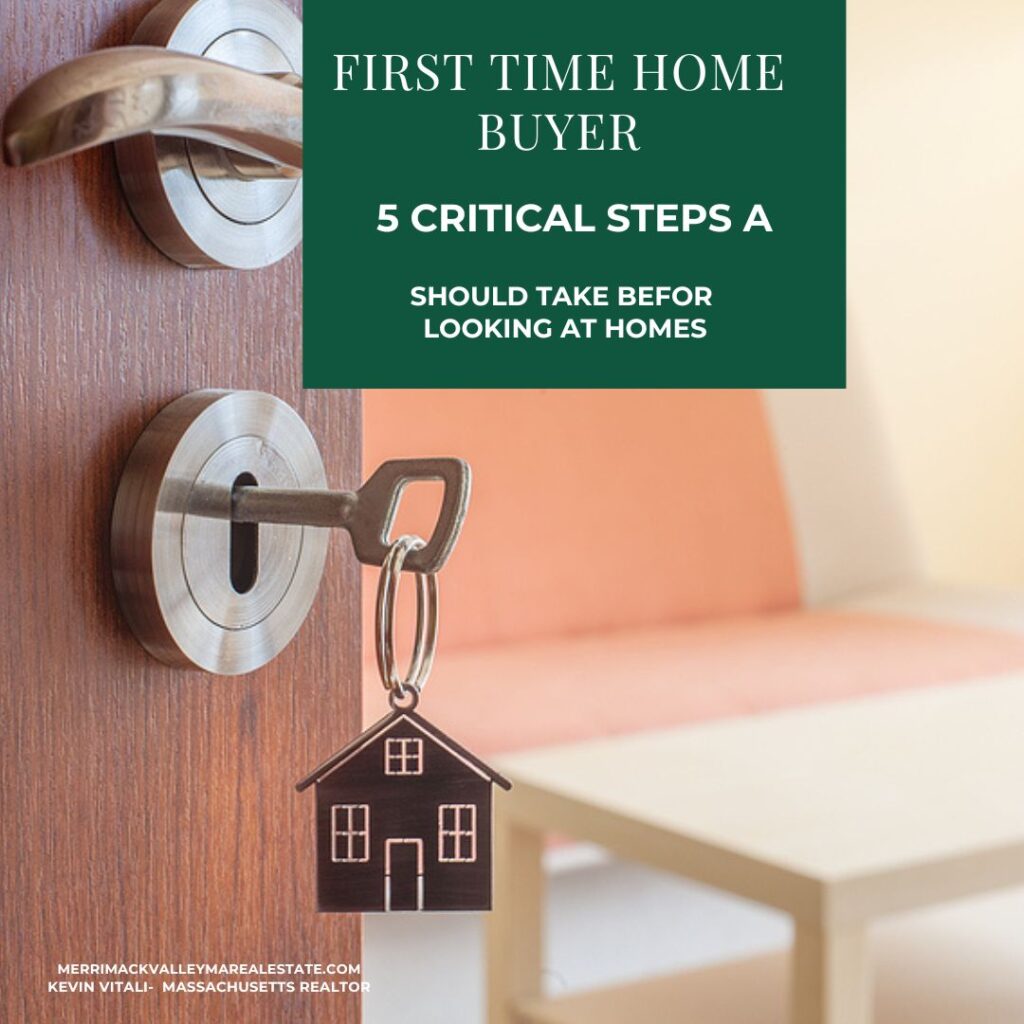 Buying a home raises a lot of questions. One area of home buying that causes homebuyers much distress is the list price or asking price of a home.
Buying a home raises a lot of questions. One area of home buying that causes homebuyers much distress is the list price or asking price of a home.
The home buyer does not want to make a mistake and overpay for a home,
Is the asking price too high?
Or now in a hot seller’s market, is the asking price too low?
How much should I offer for a home?
Should I offer below the asking price?
Do I need to offer above the list price?
How Much above?
Of course, as a homebuyer, you don’t want to overpay for a house. But you also want to offer a price that gets you the house in a competitive bidding situation.
There is never a guarantee that your offer will get you the home of your dreams. But there is a logical process to go through to determine if you should offer below the list or ask price or if it is warranted to offer above the list price and how much.
The Relationship Between The Asking Price of A House Price and The Sell Price
The asking or list price of a home is just that. It is what a seller and their real estate agent have determined is the fair market price for the home.
Or, outside of their agent’s advice, what a seller wants for a home, regardless of the true value of the home.
The list price for a home does not always reflect what a home is worth.
A home could be overpriced, underpriced or priced right at fair market value. At the end of the day, the list price of a home is what a seller thinks their house is worth. Houses Are Unique
Houses Are Unique
When determining if the price the seller is asking for a home is a fair price, a unique challenge is presented.
If you are buying a car you can compare prices of the exact same car from one dealer to the next. But there are no two homes that are exactly alike. Even identical homes in the same neighborhood can have slight differences that affect the value.
One home could be on the top of the street and the other on a cul-de-sac. While the two homes are identical, there will be a significant value difference. The difference in value will be reflected in a higher asking and sale price for the home sitting on the cul-de-sac.
Overpricing a Home
Some sellers overprice a home for one or more reasons. They may just think it is worth it, leave wiggle room for negotiating, know it is overpriced but are hoping for more or any number of other reasons.
As a homebuyer, you may find homes price is severally overpriced or maybe just a little overpriced.
A home with an asking price that is overpriced will often languish on the market and often have one or more price drops.
Pricing A Home At Fair Market Value
Setting a home’s price right at fair market value is what most real estate agents are hoping for when they list a home.
Setting a home’s asking price right at market value will usually generate a reasonably quick offer and sell the home in the range of fair market value.
By listing a home with a price right at the market value, the seller will usually net the most amount of money from the home sale.
Underpricing A Home
There are some agents and sellers that set a list price slightly below the market to generate interest. A home that is slightly underpriced might be flooded with offers.
You can also guarantee the home will generate multiple offers over asking.
As you can see the asking price may or may not reflect the true value of a home. A seller can set any list price they want.
Determine A Fair Price To Pay For The Home- It May Not Be The List Price
If you are working with a seasoned buyer’s agent, they will prepare a Comparative Market Analysis or CMA of the home you are interested in.
The Zillow Zestimate is not accurate for determining the market value of a home.
Neither is the tax assessment an indicator of fair market value.
A CMA will give you an accurate range of what a home is worth regardless of what the asking price may be for a home.
From there you can determine if the list price falls in the range of what is a fair price to pay for a home.
It is impossible to structure a winning negotiating strategy without first having a clear picture of the home’s value compared to the list price of a home.
Remember a seller can ask any price they want for a home, but in no way is the asking price a determination of value.

How Much Below Asking Price Should You Offer On A House?
A buyer who is interested in putting a bid or offer on a home will often ask
how much below asking price should I offer?
or….
what is reasonable to offer below list price
The simple answer is it depends.
Unilaterally thinking you must always offer below the list price of a home will lead to heartache in many instances.
Of course, you can offer any price you want, but there are 3 factors to consider when making a competitive offer on a home.
Bid Price vs Asking Price vs Fair Market Value
On a home that is asking a price that is 20% or more over fair market value, it would not be out of the question to offer 20 to 30% or more under the asking price of the home.
But for a home that already has a list price that is set at the fair value of a home, you would be doing yourself a disservice by offering 20-30% below the asking price.
A house that has a list price slightly below the asking price will usually generate competition among buyers, creating a multiple offer situation. If you are not coming in at or over the list price you will not be a player.
The first step in making a bid on a home is understanding the relationship between the home’s market value versus the asking price.
Understanding Current Market Conditions
The second step is to understand the real estate market you are in currently. Current real estate market conditions combined with where the market price is versus the asking price will indicate the level of competition you may encounter and will set the pace of negotiations.
The market indicates who will be in the driver’s seat during negotiations as well.
Seller’s Market
A seller’s market favors the seller. It is indicated by low market times or days on market (how long until a property is put under agreement), low inventory and a high list-to-sold price ratio.
In a strong seller’s market, it is not unusual to see a list-to-sell price ratio of 100% to 104%+. The list-to-sell price ratios show the percentage homes have sold for vs the asking price.
A seller’s market means there are more homes than there are buyers. The competition will be high and you will see multiple offers on a home.
It is important to have a competitive bid on a home and wrap up negotiations quickly. Another buyer can come in and scoop the property while you s trying to get a steep discount on a property.
Neutral Market
A neutral market means there needs to be some give and take from both parties. Neutral markets will have longer market times of 45-90 days. There is an equal balance of sellers versus buyers in the market.
A neutral real estate market gives a buyer a chance to negotiate a little with less fear of another buyer out-negotiating them. Do your homework on fair market value versus the asking price and still wrap up negotiations quickly.
Buyer’s Market
A buyer’s market has more houses for sale than there are buyers. Houses linger on the market, inventory will be high and you will see list price to sell price below 98%.
Strong buyer’s markets put buyers in the driver’s seat. This is where you should start thinking about how much below asking should you offer.
The buyer’s market gives a buyer time to negotiate. It lessens the fear of running into other buyers on a home.
So far you can see that the true market value and market conditions play a large role in structuring a negotiating strategy. It is a mistake to unilaterally think you should offer below the asking price on a home.
In a strong seller’s market, like we are in right now, you won’t even be on a seller’s radar. Instead of thinking how far should below the list price should I offer, you should be thinking how much over asking should I offer.
Real Life Data Of A Real Estate Market
Here we are going to look at two very different real estate markets for Haverhill Massachusetts.
August 2020 vs August 2009
Today there are 35 houses currently for sale in Haverhill MA versus 202 in 2009.
Days to offer is 21 today versus 83 in 2009.
List to Sell price is 100% today with a segmented range of 90% to 102% of asking. In 2009 it was 92% with a range of 82% to 95%.
The numbers start to indicate what the buying trends are for a town. In 2009 there was high inventory. Combined with a low list price to sell price and long market time show it was a buyer’s market.
A buyer could be far more aggressive with their negotiating.
With extremely low inventory and market times today, most properties are going above list price or over asking price . You need to be close to asking or even consider going over asking on most properties to even be considered
Your Personal Desire For A Home
The last consideration is your personal desire for a home. While it plays very little into the value of a home, each home has a range of fair market value.
There may be homes that you are willing to lose over tough negotiations due to the amount of work it may need or a less-than-desirable location.
Or, there may be a home you love and is it really worth losing over $10k or $15k after looking at 30 homes?
Your personal desire for a home will play a small part on what you offer for a home.
Summary
The asking price of a home does not necessarily translate into fair market value. Fair market value is determined by a Comparative Market Analysis.
It is important to note if you are buying a home through your local Multiple Listing Service, the expectation is you are going to be paying fair market value. The seller is represented by a listing agent and they would not let a home be sold for significantly less than market value.
But other factors need to be considered before making an offer on a home. The current market conditions of your local market will give a strong indication of how to negotiate for a home.
Current market conditions combined with determining the fair market value of the subject home and your desire for the home will drive whether you offer under asking, right at asking or even over asking.
The data will give you a strong indication of what you should offer whether it be below or above asking. And how much below or above the list price you should go. You will need a very savvy buyers agent to help interpret that data.
A home severally overpriced even in a seller’s market could warrant starting negotiations well below asking. There is not a one shoe fits all solution to determine a starting bid price.
The Asking Price of a Home- Should I Offer Below Asking or Above Asking Price? is provided by Kevin Vitali, a Massachusetts REALTOR based out of Northeastern Massachusetts.




